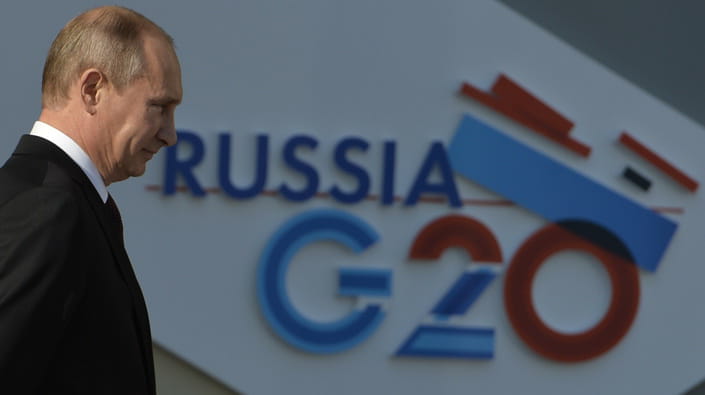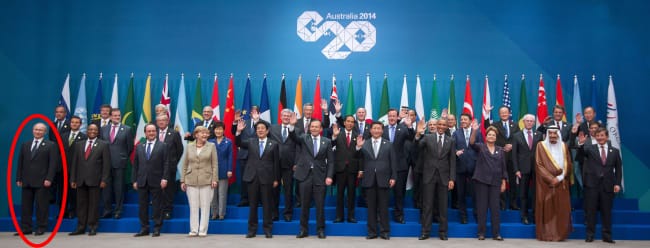Details of G20 Summit. Russia Forces the World To Turn a Blind Eye to Its Aggression. West Plays Along

The G20 Heads of State and Government Summit will kick off in Indonesia in exactly one week.
"European Pravda" learned the draft decisions of this meeting and discovered that it carries a serious, albeit hidden, danger for Ukraine and the world. The Western partners do not realise they are handing the trump cards to the Russian aggressor.
In 2022, the year of the world order collapse due to Russian aggression against Ukraine; a year of unprecedented growth in energy prices due to Russian blackmail; a year of a big threat of famine for many people around the world, preparations for the G20 summit have attracted a lot of attention.
Someone was waiting for Putin's meeting with Biden and expected that it would be able to put an end to the Russian-Ukrainian war. Russia has been particularly active in promoting these clearly false expectations. Another false expectation is widespread in Ukraine: many expect Russia to be kicked out of the G20 this time.
But as long as attention is focused on unrealistic scenarios, Russia is preparing to emerge victorious from the battle.
Moscow returned to major international politics and found out that the world was ready to "ignore" aggression for the sake of its own comfort zone, favouring the aggressor state.
Summit without Putin
"It is very likely that Vladimir Putin will not go to Bali," believe European Pravda sources, informed about the organisation of the G20 summit. Indonesian President Joko Widodo also confirmed this on Monday.
There is a small chance that Putin will change his mind at the last moment but this will lead to his image losses. He has no real reason to go to Bali.
The Kremlin hoped till recently that the G20 summit would bring Putin out of de facto international isolation if other world leaders agreed to negotiate with him.
The White House publicly warned: Biden has no intention of meeting with his Russian colleague. European leaders also did not give positive signals about the meeting. Volodymyr Zelenskyy publicly issued an ultimatum: if Putin comes to Bali, Ukraine, an invited guest at the summit, will ignore this event.
If Putin came to Bali, the year 2014 when Russian invaded Ukraine could repeat itself. Putin left the G20 summit in Australia humiliated. He had to be in a corner for a joint photo. Other leaders did not want to stand next to him
Such a visit could only emphasise Putin's isolation.
That is why Russia would like to send Prime Minister Mishustin to Bali.
This means that Zelenskyy can video address the meeting. A personal trip of the Ukrainian President to Bali was not considered. He has not left the country at war for a single day and is not going to do so.
Does this really mean a diplomatic victory for Ukraine? Questionable.
Kyiv itself has raised the stakes too high.
The Office of the President and the Ministry of Foreign Affairs publicly demand to kick out the Russian Federation from the G20. But it is definitely not going to happen at the summit in Bali.
Not only democracies belong to this club. The leaders of Turkey and Indonesia publicly convince Zelenskyy to meet with Putin to "negotiate peace." The G20 includes China, which has publicly warned that it will not vote for Russia's expulsion. There is no consensus.
It means that Russia will participate in the summit even if Putin is not there. Russian diplomats are already participating in the summit's decision-making. Quite successfully.
World without Russian aggression
A source among the G20 member state shared with "European Pravda" several drafts of the summit's final decision as of late October and early November, with the proposals of the parties.
The document reads that the summit will result in a "Leaders' Declaration." Its newest version is 15 pages and about 50 paragraphs long but may be shortened during negotiation. Since it is confidential, we cannot verify its authenticity. However, "European Pravda" analysis assumes that it is a real proposal. Another EuroPravda source confirmed the main challenge of this Declaration.
This project takes a step towards "normalising" Russian aggression and tries to establish global politics as usual.
The Doctrine is yet to be agreed on.
The G7 states and states prone to compromises with the Russian Federation (in particular, the host of the summit, Indonesia) are disputing the Declaration. One of our sources claims that Germany and France defend the interests of Ukraine and the protection of peace. We cannot independently verify this information.
It is the hardest to agree on paragraph #3 on "geopolitical dynamics."
However, even previously agreed-upon points are upsetting.
Outside the "geopolitical" paragraph, they mention "war in Ukraine" only once. Even though the aggressive war, launched against the requirements of the UN Charter and other world rules, changed all spheres of international relations and created many crises, they prefer not to mention it in the description of these crises.
In the thematic sections of the Declaration, only some abstract "geopolitical challenges" are named. They suggest mentioning twice "challenges for international peace and security." But even these weak-of-will formulations have been contested by Russia.
For example, they would prefer to mention that the world is in a deep crisis in the wording that the G20 is "concerned about the multidimensional crisis that includes the Covid-19 pandemic" and put an end to it.
The debate on this point continues, but as we heard, the West weakened its position. At first, they insisted on "challenges to peace and security" as a component of the crisis. Now they have picked a "compromise" proposal - to write instead about "challenges arising from the geopolitical situation."
Like, what war do you mean? What aggression? It is just geopolitics. Don't make up anything!
Agreeing on this point will be one of the litmus tests. If the Russian Federation is able to reduce the global security crisis to Covid-19 alone and even more to turn its aggression into "geopolitics," it will be a defeat for the entire collective West and Ukraine along with it.
In addition, the already agreed document names one of the main world problems Covid-19 but not war!
Non-viable option
At the end of the last week, U.S. National Security Adviser Jake Sullivan visited Kyiv. After talks with him, the Office of the President of Ukraine said that Sullivan, among other things, assured Ukraine of support at the G20 summit.
Probably, they will back Ukraine politically, the U.S. will try to expand the coalition to protect Ukraine.
However, in international relations, not only negotiations on the sidelines are important, but also made decisions.
The collective West has become a victim of Russia's strategy to "hack" the G20 mechanisms.
Western diplomats in international organisations tend to compromise. It still worked and was considered effective.
But 2022 changed everything in the core.
Now we are talking about Russia, which is destroying the world order. There is a reasonable limit to compromises with it. Leaving aside references that Russian aggression is currently destroying the world is far beyond this limit.
The last, decisive week of work on the joint G20 statement is ahead. Western diplomats still have a chance to change the document's wording to acceptable ones. One of the key options being discussed is to write in the most problematic "geopolitical point" that the U.S., the UK, France, Germany, Italy, Japan, Canada, the EU, Japan, etc. have a different opinion than the rest of the G20.
However, this does not solve the huge structural flaws in other Declaration paragraphs, which Russia has already managed to "hack."
Under these conditions, the most reasonable solution is to give up the joint statement altogether. Disagreements with aggressive Russia cannot be overcome by searching for formulations "somewhere in between."
The U.S. and other partners need sufficient political courage. As well as Ukraine in dialogue with them on this matter.
Written by Sergiy Sydorenko
"European Pravda" editor

